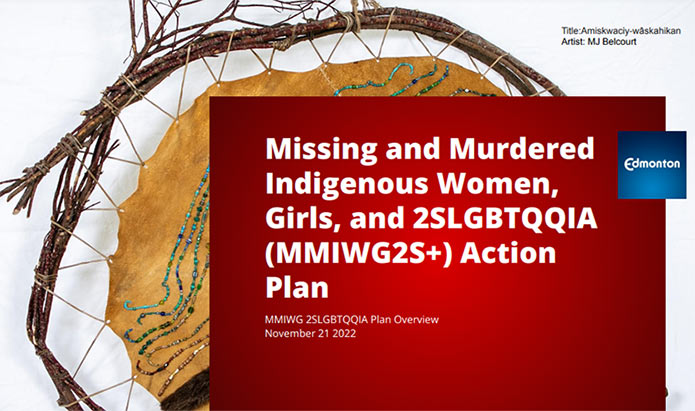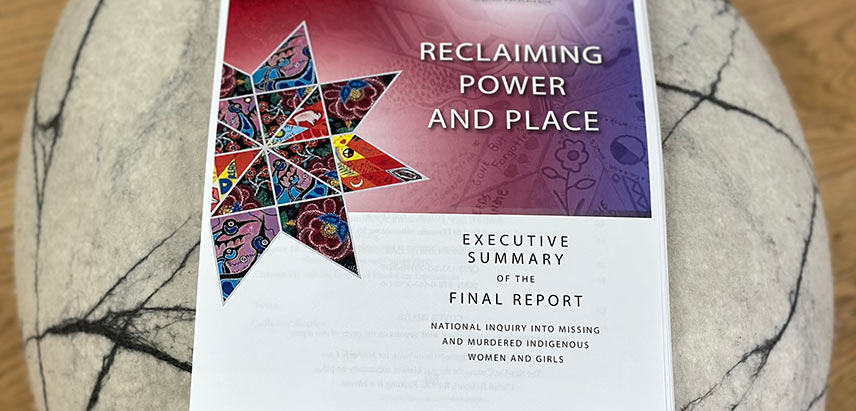Institute for the Advancement of Aboriginal Women
Stolen Sisters and Brothers Action Movement
Edmonton 2 Spirit Society
Bent Arrow Traditional Healing Society
Native Women’s Association of Canada
Creating Hope Society
The Canadian Native Friendship Centre
The Rainbow Pages
Indigenous people have been targeted at much higher rates when it comes to going missing or being murdered. Statistics consistently show that rates of violence against Métis, Inuit and First Nations people are much higher than those for non-Indigenous people in Canada, even when all differentiating factors are accounted for.
This violence against Indigenous people is systemic and is a national crisis that requires urgent, informed and collaborative action.
Indigenous women make up 16% of all female homicide victims and 11% of missing women, even though Indigenous people make up only 4.3% of the population of Canada (source: Assembly of First Nations).
In December 2023, the plan was renamed to the “MMIR (Missing and Murdered Indigenous Relatives) Action Plan” to better align with the direction of the work.
In November 2022, City Council approved the City of Edmonton’s MMIWG2S+ Action Plan. In this plan, the Indigenous Relations Office presented a way forward that the City could support - short, medium, and long-term actions under the themes of awareness building, addressing underlying causes and Indigenous resurgence.
In the MMIWG2S+ Action Plan, there are 4 themes identified through conversations with community members involved in the local efforts to eradicate violence against Indigenous Peoples: Awareness, Addressing, Resurgence and Advocacy.
The Final Report of the National Inquiry into Missing and Murdered Indigenous Women and Girls.
Beginning in 2016, the National Inquiry into Missing and Murdered Indigenous Women and Girls held 15 community hearings and spoke with 2,386 people. A final report was released in June 2019, which includes 231 Calls for Justice.
These Calls for Justice are legal imperatives. They represent important ways to end the genocide and transform systemic and societal values that have worked to maintain colonial violence. These calls are directed at governments, institutions, social service providers, industries and all Canadians.
Indigenous Edmonton Directory
This directory was produced in collaboration with Indigenous communities to help individuals and Indigenous people navigate various programs and services offered in Edmonton.
How to Get Involved in the MMIR Movement
You can:
- Attend a community event
- Participate in a vigil
- Sign up to be an Aboriginal Alert Champion
- Wear red on special event days
- Take the Moose Hide Campaign Pledge
- Walk, run or ride in support of local organizations or causes. Some examples include: running to raise awareness, running to raise funds or a pilgrimage walk
Indigenous Commemorations
| Moose Hide Campaign | May (dates vary) |
|---|---|
| Red Dress Day | May 5 |
| Blue Jean Jacket Day | June 6 |
| Okîsikow (Angel) Way | June 14 |
| National Day for Truth and Reconciliation | September 30 |
| Sisters in Spirit Day | October 4 |
For Immediate Support
Additional Supports and Resources
Missing Persons - Edmonton Police Service
Report a Missing Person - Government of Alberta
Navigating Missing Persons and Homicide Investigation Processes in Alberta: A Family Guide - BearPaw Media and Education
Missing Persons and Persons at Risk Toolkit - Ka Ni Kanichihk
What to do When a Friend or Family Member Goes Missing - Aboriginal Alert
Policy Centre for Victim Issues - Government of Canada
Reclaiming Power and Place: The Final Report of the National Inquiry into Missing and Murdered Indigenous Women and Girls
Missing and Murdered Indigenous Women, Girls, and 2SLGBTQQIA+ People National Action Plan
Missing and Murdered: The Unsolved Cases of Indigenous Women and Girls - CBC News
The REDress Project
Fact Sheet: Violence Against Aboriginal Women - Native Women’s Association of Canada (NWAC)
Organizations and Associations
Publications
Indigenous Organizations and Service Directory - Government of Alberta
Books and Literary Readings
Podcasts
Missing and Murdered: Finding Cleo
TAKEN the Podcast
Signal for Help
Unreserved with Rosanna Deerchild: Tackling the Crisis of MMIWG2S+ (Feb. 10, 2023)
2 Crees in a Pod: Missing and Murdered Indigenous Women and Girls with Gladys Radek (Oct. 4, 2020)
We Are Resilient: An MMIW True Crime Podcast by We Are Resilient
Why MMIR?
Missing and Murdered Indigenous Relatives (MMIR) is an umbrella term that includes all Indigenous people who experience the impacts of colonial violence. It is inclusive of all genders and identities. While it is still incredibly important to recognize the gendered violence experienced by women, girls and two spirit individuals, it is also important to recognize the realities of missing and murdered men and boys.
The individuals who are missing or have been murdered are more than statistics, they are our relatives.
What is the Difference Between:
MMIW, MMIWG, MMIWG2S+, MMEIP, MMIMB, and MMIR?
Different communities, governments, and community members utilize different acronyms around Missing and Murdered Indigenous Peoples’. This is based on lived experience, policy documents, and knowledge.
- MMIWG - Missing and Murdered Indigenous Women and Girls
- MMIWG2S+ - Missing and Murdered Indigenous Women, Girls, Two Spirit. “Two-spirit” refers to a person who identifies as having both a masculine and a feminine spirit and is used by some Indigenous people to describe their sexual, gender and/or spiritual identity while “+” stands for other ways that individuals may wish to express their gender and sexuality outside heteronormativity and the gender binary
- MMEIP - Missing, Murdered, and Exploited Indigenous Peoples
- MMIMB - Missing and Murdered Indigenous Men and Boys
Contact Us
Indigenous Relations Office
Community Services
18th Floor, Edmonton Tower
10111 104 Avenue NW
P.O. Box 2359
Edmonton, AB T5J 2R7
Email Indigenousrelations@edmonton.ca
Phone 780-944-7602
Fax 780-577-3525



